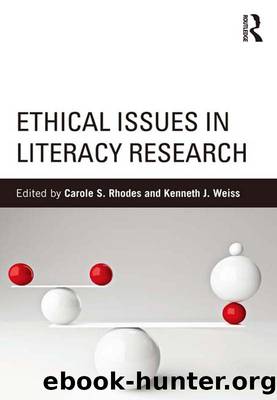Ethical Issues in Literacy Research by Rhodes Carole S.;Weiss Kenneth J.;

Author:Rhodes, Carole S.;Weiss, Kenneth J.;
Language: eng
Format: epub
ISBN: 1170306
Publisher: Taylor & Francis Group
The Importance of Quality Teachers and Principals
Building on my vignette, the questions I offer above, and the current atmosphere of accountability in schools, I see that there are two main ethical dilemmas facing any educational researcher. First, the teacher, the principal, and/or the superintendent has given some sort of permission for the researcher to enter the classroom and collect quantitative data, qualitative observations, and/or a combination of the two. Thus, the researcher has an ethical obligation to not embarrass them through public shaming. Second, the literacy researcher should always remember that our real mission is to help students learn how to read and write, and that we are doing research in order to improve the teaching of teachers so that students benefit. Thus, although as invited guests we have an ethical obligation not to embarrass teachers, principals, and superintendents, as the advocates of children we do have to speak truth to power in ways that enable students to maximize their literacy learning so that they can become productive citizens.
Please note: I donât mention that passing tests is part of my goal as an educational researcher. I recognize thatâs the pressure that teachers and principals face each and every day. Furthermore, I noted during my vignette that my math program helped triple the number of students who passed the test. But I designed my math program around what I believed students needed to be able to accomplishânot around state tests. Additionally, I never timed my students on their computational fluency or on oral reading fluency before I came up with my teacher action research project. In my daily math teaching, I would first complete my small group work with the students, and then tell them they could work in puzzle, art, computer, or reading centers as soon as they were done with their follow-up seatwork (i.e., word-problems and/or computational worksheets). For oral reading fluency, I relied upon my ear for whether my students sounded accurate and prosodic (Young & Rasinski, 2009).
Next, I believe that there are two second level ethical dilemmas that teachers, researchers, and administrators have to recognize. First, I believe that each of us thinks in different ways. In fact, my current research (Oldrieve & Bertelsen, 2011) is directed to showing how the preschool ways of knowing that were recently outlined by Rowe and Neitzel (2010) become adult ways of knowing reflected in the teaching and researching styles of educators. Thus, a processoriented teacher must be respected by a conceptual researcherâand vice versa. Therefore the conceptual researcher has to bend his/her analytical framework to allow a great process-oriented teacher to be evaluated as great. In turn, teachers need to be willing to bend to the learning needs of their students.
Thus, I believe in the field of literacy research, the results of the First Grade Studies (Bond & Dykstra, 1967) has come to define our perception of the proper balance between programmatic teaching techniques and the need for well-trained teachers and principals. The purpose of the First Grade Studies was to try to end the debate over what was the best way to teach reading to students.
Download
This site does not store any files on its server. We only index and link to content provided by other sites. Please contact the content providers to delete copyright contents if any and email us, we'll remove relevant links or contents immediately.
The Art of Coaching Workbook by Elena Aguilar(50172)
Trainspotting by Irvine Welsh(21081)
Twilight of the Idols With the Antichrist and Ecce Homo by Friedrich Nietzsche(18326)
Fangirl by Rainbow Rowell(8820)
Periodization Training for Sports by Tudor Bompa(7948)
Change Your Questions, Change Your Life by Marilee Adams(7407)
This Is How You Lose Her by Junot Diaz(6479)
Asking the Right Questions: A Guide to Critical Thinking by M. Neil Browne & Stuart M. Keeley(5391)
Grit by Angela Duckworth(5324)
Red Sparrow by Jason Matthews(5231)
Paper Towns by Green John(4828)
Room 212 by Kate Stewart(4772)
Ken Follett - World without end by Ken Follett(4470)
The Sports Rules Book by Human Kinetics(4101)
Housekeeping by Marilynne Robinson(4088)
Double Down (Diary of a Wimpy Kid Book 11) by Jeff Kinney(3963)
Papillon (English) by Henri Charrière(3946)
The Motorcycle Diaries by Ernesto Che Guevara(3806)
Exercise Technique Manual for Resistance Training by National Strength & Conditioning Association(3801)
